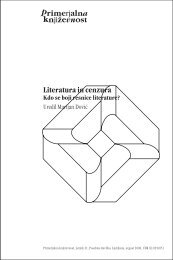Inštitut za slovensko izseljenstvo in migracije ZRC SAZU
Inštitut za slovensko izseljenstvo in migracije ZRC SAZU
Inštitut za slovensko izseljenstvo in migracije ZRC SAZU
You also want an ePaper? Increase the reach of your titles
YUMPU automatically turns print PDFs into web optimized ePapers that Google loves.
The Performative Power of Translocal Citizenship<br />
Scott (1990: 184), “provides much of the cultural and structural underp<strong>in</strong>n<strong>in</strong>g of the more visible political<br />
action on which our attention has generally been focused”. It is as much a product of political necessity<br />
as of political choice, so we should understand the <strong>in</strong>frapolitics of a new (performative) citizenship<br />
not only as a form of political resistance under the conditions of tyranny, but also as “the silent partner<br />
of a loud form of public resistance” of modern democracies. Performative citizenship is not part of the<br />
ma<strong>in</strong>stream, and although many times it is hard to detect this “immense political terra<strong>in</strong> that lies between<br />
quiescence and revolt”, it is still real politics, “<strong>in</strong> many respects conducted <strong>in</strong> more earnest, for<br />
higher stakes, and aga<strong>in</strong>st greater odds than political life <strong>in</strong> liberal democracies” (ibid., 200). The political<br />
struggles of Sans-Papiers <strong>in</strong> France, the Erased <strong>in</strong> Slovenia, “illegal” immigrants <strong>in</strong> the United States et<br />
cetera, only attest this further.<br />
3. IMAGINING A NEW CITIZENSHIP<br />
A reconfiguration of the relationship between equality and difference will, accord<strong>in</strong>g to Gerard Delanty<br />
(2000: xiii), be one of the most important aspects of a new citizenship. Citizenship is nowadays perhaps<br />
the most important po<strong>in</strong>t of contest about the identity and recognition of (group) differences that cannot<br />
be resolved by the current model of multiculturalism, or can rather only be resolved <strong>in</strong> times of<br />
economic growth. Today it is obvious that the multicultural project <strong>in</strong> its hegemonic form did not succeed.<br />
Yet, contrary to the plethora of conservative and nationalistic objections to multiculturalism, we<br />
can detect its limitations, <strong>in</strong>ter alia, <strong>in</strong> its follow<strong>in</strong>g characteristics:<br />
1. it is an <strong>in</strong>appropriate framework for new citizenship because it still places citizenship with<strong>in</strong> the<br />
framework of the nation-state;<br />
2. it overlooks that the <strong>in</strong>tegration of “others” can, at the same time, lead to their exclusion or subjugation;<br />
3. it is still a Eurocentric approach to the reconfiguration of equality – a difference that is unable to<br />
understand Western universalism simply as another particularism;<br />
4. it is the prime expression of the cultural logic of global capitalism; and<br />
5. it tends to be apolitical, thus ignor<strong>in</strong>g the problem of power relations, <strong>in</strong>equality and exclusion<br />
and, with an emphasis on tolerance that does not demand active participation and cooperation<br />
with others, it results <strong>in</strong> “repressive tolerance” (Marcuse 1965). 1<br />
In contrast, a new citizenship also rejects the paradigm of universalism s<strong>in</strong>ce it only results <strong>in</strong> the homogeni<strong>za</strong>tion<br />
and uniformity of polities, but not also <strong>in</strong> social justice and the <strong>in</strong>clusion of their members.<br />
Universal citizenship and the related enlargement of the scope of the political subjects have certa<strong>in</strong>ly<br />
represented an important political achievement. We should still understand this process with<strong>in</strong> its<br />
historical context as this would reveal that it has not been <strong>in</strong>itiated to empower new political subjects<br />
but to reflect a deep concern about the fate of the new political <strong>in</strong>novation – the modern nation-state.<br />
The concept of a uniform, homogeneous citizenship emerged as a political tool and is, accord<strong>in</strong>g to<br />
James Scott (1998: 32), merely a poor abstraction that can be compared to the <strong>in</strong>vention of meter, kilogram<br />
and other units of measurement, standards and reforms needed for the adm<strong>in</strong>istrative, economic<br />
and cultural standardi<strong>za</strong>tion of heterogeneous and fluid political entities. We can thus understand universal<br />
citizenship as a political equivalent to the meter that was <strong>in</strong>troduced with a revolutionary decree<br />
stat<strong>in</strong>g: “The centuries-old dream of the masses of only one measure has come true! The Revolution<br />
has given the people the meter” (ibid.). If the universal meter swept away differences <strong>in</strong> the units that<br />
it measures, then universal citizenship swept away and denaturalized differences among “unmarked”<br />
1 For more on the limitations of multiculturalism as a political project and a description of social reality, see Santos,<br />
Nunes and Meneses (2008: xxiii–xxiv).<br />
11

















